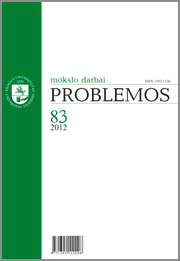G. DICKIE’O EKSTENSIONALISTINIO-INSTITUCINIO MENO APIBRĖŽIMO NEAPIBRĖŽTUMAS
INDEFINITENESS OF GEORGE DICKIE’S EXTENSIONAL-INSTITUTIONAL DEFINITION OF ART
Author(s): Ieva StraukaitėSubject(s): Philosophy
Published by: Vilniaus Universiteto Leidykla
Keywords: Dickie; institutional definition of art; anti-essentialism
Summary/Abstract: A major problem in contemporary analytic philosophy of art is whether and how it is possible to define art. The paper analyzes George Dickie’s institutional definition of art. His response to anti-essentialists’ arguments which deny the possibility to define art is presented. It is argued that Dickie attempts to substantiate his definition of art by invoking extensional methodology on the basis of which he construes the criteria for distinguishing between art and non-art as externalistic semantic, externalistic epistemic, and value-neutral. It is asserted that the institutional definition of art formulated by Dickie cannot be considered a definition of art as it is sustained by a logically vicious circle. Hence the conclusion that Dickie does not substantiate the possibility of a definition of art but introduces an extensional-institutional conception of art.
Journal: Problemos
- Issue Year: 2013
- Issue No: 83
- Page Range: 173-184
- Page Count: 12

